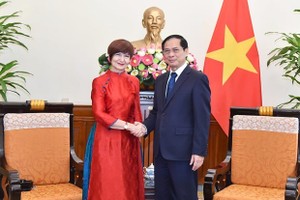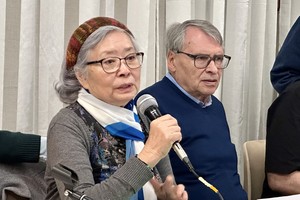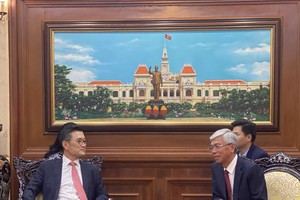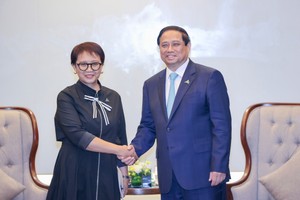A Bahraini opposition figure said reconciliation talks between the Sunni monarchy and the Shiite opposition started Tuesday for the first time since anti-government protests erupted in the Gulf kingdom.
Washington has pushed for dialogue in the strategic island nation, home to the U.S. Navy's 5th Fleet. The protests that began in February — inspired by wider Arab uprisings — have been the gravest challenge to any Gulf ruler in decades.
The opposition figure, who spoke on condition of anonymity because he was not authorized to speak to the media, confirmed that the government-led talks took place behind closed doors in the capital Manama's convention center.

The talks are scheduled to last until the end of the month, with about 300 delegates from government-linked groups and opposition parties meeting three times a week.
How the country's rulers approach the so-called National Dialogue largely depends on how comfortable neighboring Saudi Arabia is with Bahrain's Sunni leaders making concessions to the country's Shiite majority, who comprise around 70 percent of the kingdom's population of some 525,000.
Saudi Arabia does not have a seat at Bahrain's crisis talks, but it carries a critical voice in everything from the tone of the debate to the eventual offers on the table.
"Saudi Arabia wants dialogue since confrontation is not the Saudi way of dealing with things," said Marina Ottoway, director of the Middle East Program at the Carnegie Endowment for International Peace.
She believes that Riyadh is fully behind the reconciliation talks because they are designed by the government and cannot be seen as turning into "negotiations between the monarchy and the people."
Saudi King Abdullah deployed about 1,000 troops to Bahrain, per Manama's request, during the uprising earlier this year to help quell protests.
For the powerful Saudi royal family and its Gulf partners, any setbacks by Bahrain's 200-year-old ruling Al Khalifa dynasty is considered a threat to all monarchs and sheiks in the Gulf.
"Bahrain is crucial to Saudi national interest and Riyadh will provide it with all they have to show they are committed to preserving the rule of the Khalifas," said Ayham Kamel, a Middle East analyst at the Eurasia Group in Washington.
To reign in protesters, Bahrain's government also arrested hundreds of people and temporarily instated an emergency law. At least 32 people were killed in the unrest, according to international rights groups.
Many of Bahrain's Shiites claim they are the target of systematic discrimination, including being blocked from top military and political posts.
Gulf leaders have accused Iran of influencing the Shiite-led uprising in Bahrain.
Regional governments were concerned that similar revolts may be copied elsewhere in the region and that Bahrain's Shiite-led uprising could serve as a possible opening for Iran to make headway among pro-Western Gulf states anchored by Saudi Arabia.
Bahrain's opposition leaders repeatedly shot down claims that Iran had any role in the protests.
The Saudi king sent millions of dollars to pull the tiny neighbor's royals from the brink of bankruptcy. One of the king's sons also married a daughter of Bahrain's monarch.
"It's a powerful act, the royal wedding," said Rima Sabban, a Dubai-based sociologist. "It has nothing to do with love or passion. A marriage like that is strictly political."
For its part, Iran has relentlessly assailed Bahrain's rulers for crackdowns against the country's Shiite majority and called the Saudi-led Gulf troop presence an "occupation" army.
One of the opposition's demands was that the Saudi-led force leave the kingdom before any talks with the Sunni monarchy begins.
However, foreign troops remain deployed and talks have begun.
"The presence of foreign troops is part of Bahrain's problem, not the solution," said Ali Salman, the leader of Bahrain's largest Shiite opposition party, Al Wefaq, which reluctantly joined the government-designed reconciliation talks.
U.N. Secretary-General Ban Ki-moon welcomed the start of the national dialogue, noting the government's establishment of an investigation commission, the transfer of some trials to civilian courts, and the release of some detainess and encouraging Bahraini authorities to take further steps to comply with their international human rights obligations, U.N. spokesman Martin Nesirky said Tuesday.
Hundreds of protesters, however, remain imprisoned awaiting trial on charges ranging from trying to topple the government to participating in illegal protests.
Eight prominent activists are serving life sentences after being convicted of trying to overthrow the state.
Ahead of the reconciliation talks, which opened with a ceremonial session on Saturday, the government made some token concessions, including sanctioning an international investigation that will include probes into the conduct of security forces during the revolt. Authorities halted trials of opposition supporters in a military-linked tribunal and moved them to civilian courts.
"It's more to defuse criticism of the West than to make concessions to the opposition parties, like Al Wefaq, they already feel they have defeated," said Ottway of the Carnegie Endowment.
The opposition is demanding that all detainees arrested in relation to the revolt be freed, their charges dropped, and for convictions to be reversed.
For now, Shiite leaders taking part in the reconciliation talks appear willing to give Bahrain's rulers a chance.
"Our demands are clear," said Salman, Al Wefaq's leader. "For any talks to be successful, people who ask for democracy, should be released from prison and people who ask to be free should get a chance to elect their government."
























